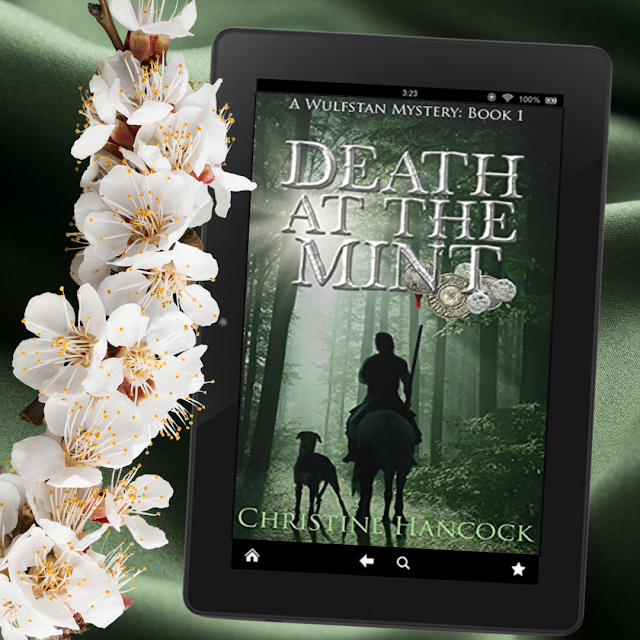Death at the Mint
(A Wulfstan Mystery, Book 1)
By Christine Hancock
Publication Date: 1st July 2021
Publisher: Madder Press
Pages: 328 Pages
Genre: Historical Thriller
When Wulfstan swore revenge on his enemy, he expected to die. Now that man is dead.
Far to the south, another body is found in an Essex wood.
Abbot Dunstan of Glastonbury is concerned. The victim ran the mint. Is the king’s coinage in danger of corruption?
Dunstan sends Wulfstan to Maldon to investigate.
Can Wulfstan discover the truth? Is there a connection with his own past?
Having lost everything he held dear; can he learn to live again?
Having lost everything he held dear, can Wulfstan learn to live again?
When Wulfstan swore revenge on his enemy, he expected to die. Now that man is dead. Far to the south, another body is found in an Essex wood. Abbot Dunstan of Glastonbury is concerned. The victim ran the mint. Is the king’s coinage in danger of corruption? Dunstan sends Wulfstan to Maldon to investigate. Can Wulfstan discover the truth? Is there a connection with his own past?
Death at the Mint is a tantalizing historical mystery engulfing a reader into this 10th-century world of intrigue. Wulfstan, a character from the Byrhtnoth Chronicles, regales his own story in this stunning novel. From the outset you learn of his friendship with Byrhtnoth and Saewen, and his own tragic past which sends him on a quest of revenge against his sworn enemy, Egbert. Along the journey to find the man, the attachment between his loyal dog, Faw, a large wolfhound, and his horse, Sleipnir, truly warms your heart and adds a level of emotion and depth to Wulfstan’s character. I truly enjoyed the addition of these animal companions. I really LOVED the line - “His sins had excluded him from God’s presence, and finally, before the service was over, he had slipped out, back to his horse and his dog. They didn’t worry that he had lost his faith.” - Such a meaty line filled with so much meaning and instantly connects the reader to the relationship between the man and his pets, revealing the necessity of their presence in his life. Brilliant!!
After finding his enemy and exacting his revenge, he is determined to find his way in life and an answer to the questions of a mysterious dream he has one night. Where is his family? What happened to his sister? After travelling to Glastonbury and speaking with Abbot Dunstan, the monk sends him on an assignment to the area of Essex to investigate the death of the mint’s coiner. Wulfstan agrees to go, hopeful he can help the Abbot as well as answer his own questions about his family who lived in the same area.
Hancock’s expertise in story-telling is quite evident in this stand-alone book, and I could not put this book down. I was hooked from the very beginning, and upon reaching the descriptions of Wulfstan’s emotions upon seeing the rising sunlight come across Glastonbury on Easter morning, the song in the air, the gilded rays shooting through the mist, the hand of God touching him... well, the sheer poetry of the words played well to my heart and mind, leaving me enthralled with this story.
Wulfstan’s character is strong, yet vulnerable; clever, insightful, sentimental, and loyal – and Hancock’s words help his character develop in a very satisfying way, even when we reach the climax of the story (which I will not reveal), you are sufficiently rooting for Wulfstan’s ultimate success in all of the avenues he has pursued on his quest to Essex.
And it is not just Wulfstan’s character that is well-developed, but all of the characters, even the ‘bad guys’, those loyal assailants to Egbert who are bent on killing Wulfstan – the details behind their actions really flesh out the characters and makes each and every scene believable as if you were reading actual historical events unfold before your very eyes. She does not hold back from depicting the brutality of the time period but softens the scenes with Wulfstan’s tenderness towards the memory of his sister and her child – which is very touching and endearing. The scope of Heil’s world-building is very cinematic and I could very well imagine this as a movie.
Another way the author draws in a reader is through her skill at setting the scene. For example: “Every hedge or ripple in the land produced a shadow, stretching towards him. As the view expanded, it appeared as if some giant had scrawled a message across the landscape, shadows black as ink standing out from the silver page. Wulfstan stood for a while to catch his breath and attempted to read the message.” You can FEEL the movement of the shadows, and see the character’s eyes scanning over the scene. This is just magical and shows great skill in the author’s use of words.
Death at the Mint is a true success for the author and the reader, with incredible character and story arcs, and a storyline that moves ever forward as if you were riding next to Wulfstan on his horse. This is a great read that I will not soon forget, and one that I highly recommend to anyone seeking a historical mystery. I hope there are more adventures to come for Wulfstan, more mysteries to solve, as I, for one, am a sworn fan of his detective work and his character.
Review by D.K. Marley
The Coffee Pot Book Club.
I was born in Essex and moved to Rugby, Warwickshire when I married. I have a husband, two sons and two lovely grandchildren.
I am a long-term family historian, leader of the local history group and town guide.
I had never thought of becoming an author – I just wanted to write about some of my ancestors. In 2013 I joined a writing class. The class turned out to be about writing fiction. Before I knew it, I was writing a novel.
Byrhtnoth was a real warrior who died in the 991 Battle of Maldon, made famous by the Anglo-Saxon poem of that name. Growing up in Essex, I visited Maldon often, and attended the 1000 year anniversary of the battle in 1991.
I wanted to find out what made Byrhtnoth such a famous warrior.
I finished the book but found it had become a series – how long, I have yet to find out.
Social Media Links:























